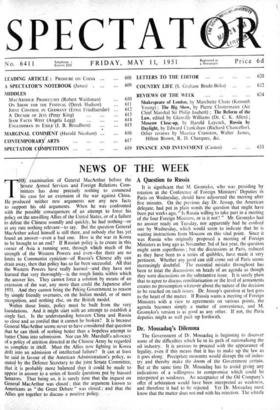NEWS OF THE WEEK
TH(' examination of General MacArthur before the Senate 4rmed Services and Foreign Relations Corn- ,...- . mittees has done precisely nothing to commend . his case for an extension of the war against China. He produced neither new arguments nor any new facts to support his old arguments. When he was confronted with the possible consequences of an attempt to force his policy on the unwilling Allies of the United States, or of a failure to defeat the Chinese soundly and quickly, he had nothing—or at any rate nothing relevant—to say. But the question General MacArthur asked himself is still there, and nobody else has yet found an answer—even a bad one. How is the war in Korea to be brought to an end? If Russian policy is to create in this corner of Asia a running sore, through which much of the strength of the Western Powers and even—for there are no limits to Communist cynicism—of Russia's Chinese ally can drain away, then that policy has so far been successful. All that the Western Powers have really learned—and they have not learned that very thoroughly—is the rough limits within which the answer lies. They cannot force a solution by means of an extension of the war, any more than could the Japanese after 1931. And they cannot bring the Peking Government to reason by simple friendly overtures, on the Indian model, or of mere recognition, and nothing else, on the British model.
Within those limits, policy must be built from the very foundations. And it might start with an attempt to establish a single fact. Is the nnderstanding between China and Russia so close and so cordial that it cannot be broken? It is because General MacArthur seems never to have considered that question that he can think of nothing better than a hopeless attempt to batter China into submission. Nor can Mr. Marshall's advocacy of a policy of attrition directed at the Chinese Army be regarded as complete in itielf. Must the Allies now fighting in Korea drift into an admission of intellectual failure? It can at least be said in favour of the American Administration's policy, as stated by the Defence Secretary to the joint Senate Committee, that it is probably more balanced thin it could be made to appear in answer to a series of hostile questions put by biassed Senators. That being so, it is surely time that the inquest on General MacArthur was closed: that the argument known to Americans as "the Great Debate" was closed: and that the Allies got together to discuss a positive policy. .


































